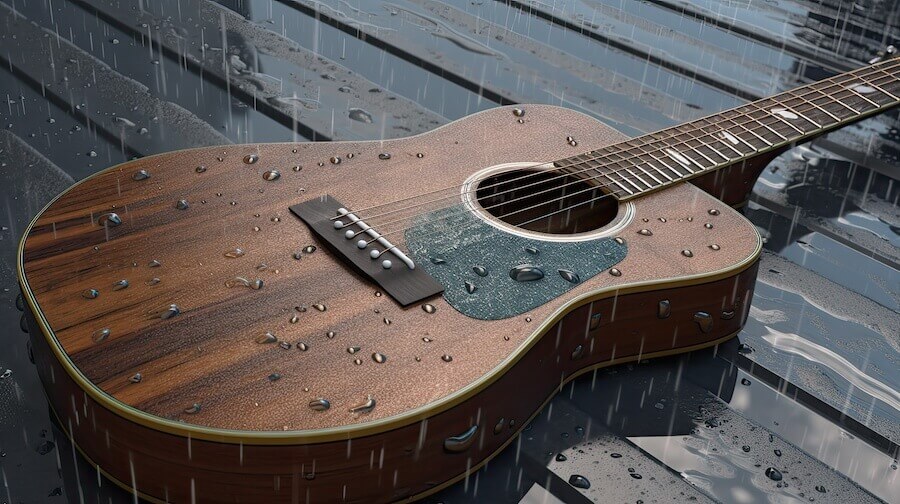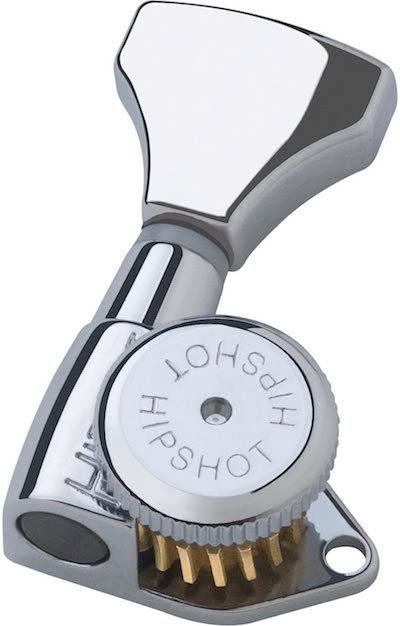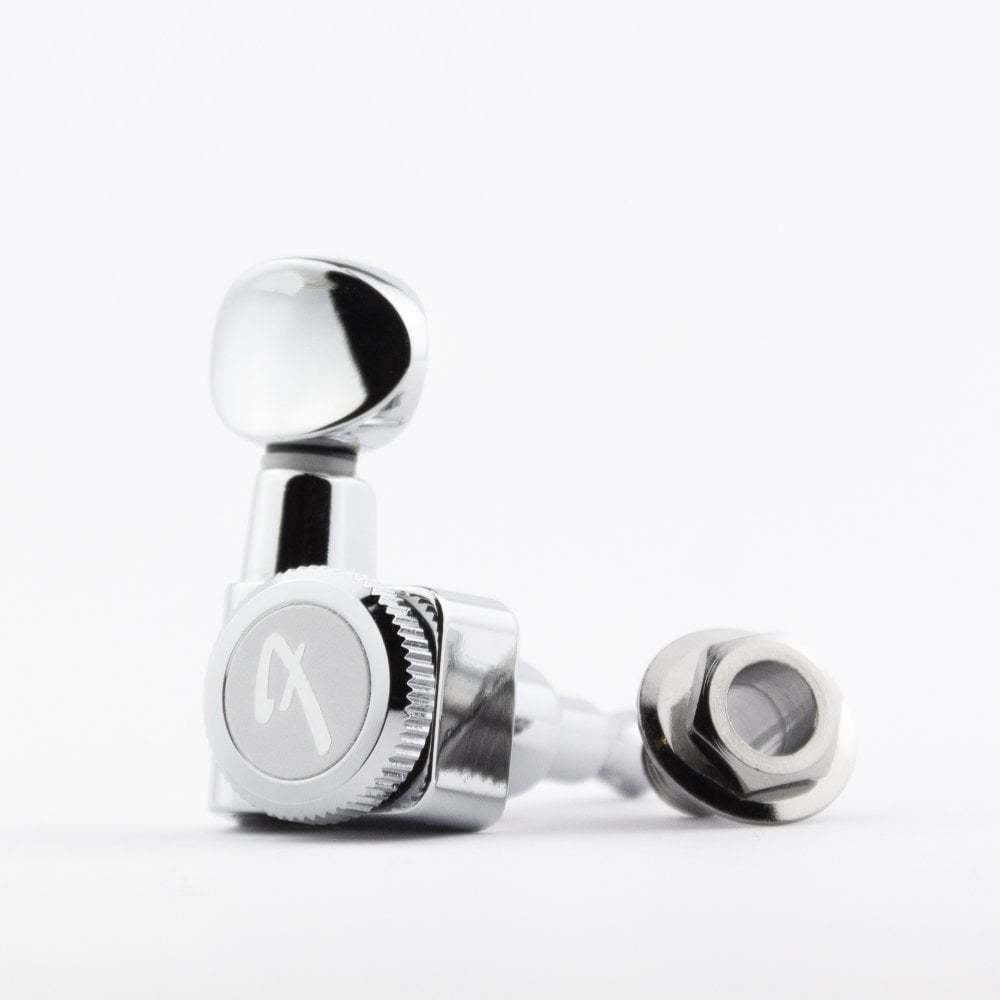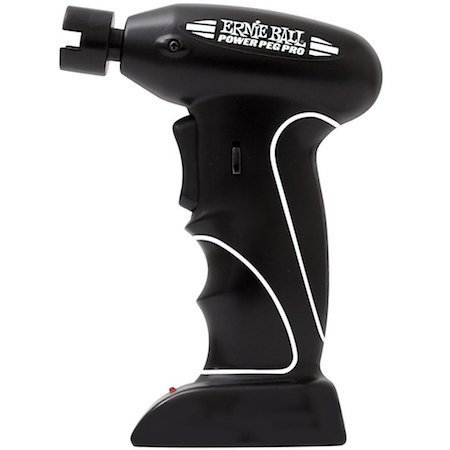Wondering why your guitar strings are breaking when restringing, tuning or playing? Learn the real reasons why they’re breaking and how to fix them.
Hands-up anybody who’s been tuning their guitar, then all of a sudden you hear that heart-stopping ‘twang’ as a string breaks?
The absolute pits, isn’t it?
All guitar players fall victim to guitar strings breaking. But if you’re scratching your head wondering why your strings seem to be breaking far too often, in order to quickly fix the issue, you need to ask yourself these two key questions:
- Q1. Did the string break when restringing or while tuning?
- Q2. Have you noticed your guitar strings always seem to break at the bridge, nut, fretboard, or tuning peg most?
Breaking guitar strings can be a major hassle, but don’t worry, whatever your answers are to the previous two questions, we have the solutions in this post.
Keep reading.
1.Old strings cause guitar strings to break

Anyone with a half-decent ear can tell you old guitar strings sound terrible. This is because strings oxidise (rust) over time mainly due to exposure to moisture in the air and the build-up of dirt, oils and dead skin from your fingers. Lovely.
The downside of keeping old strings on your guitar isn’t just that they make it sound dull and lacklustre – the deterioration makes them less pliable, difficult to play, and, therefore, more prone to breakage.
So, If you’re tearing your hair out, confused as to why you’re going through strings quicker than a speed metal drum solo, it might be time to get your finger out and try one of the fixes coming up.
The Fix ⬇
There are easy fixes for this cause of string snapping – put new strings on your guitar. It’s crucial you also know when to change your guitar strings.
Once you get new strings on your guitar, there are quite a few measures you can take to get more life out of them too:
1) Get into the good habit of wiping down your guitar strings with a microfibre towel after you play.
From fingerboard and string cleaning tools to complete guitar care kits, removing grime and dirt from your guitar strings and fretboard is a simple yet crucial step you can take to minimise string failure.
2) Ditch those cheap and nasty strings and get some better-quality coated guitar strings.
Thanks to a thin liquid polymer coating on the outer layer, coated strings have a much longer lifespan than regular non-coated because sweat and oils from your fingers are prevented from penetrating and corroding them.
➡️ Recommended Best Guitar Strings (Acoustic & Electric)
2. Bridge, nut, or tuning peg issues cause guitar strings to break
My strings are breaking at the bridge
If your string is repeatedly breaking near the bridge, you can bet your bottom dollar the saddle may have a ‘burr'(sharp edge) snagging your strings.
The sharp edges can be caused by general wear and tear, such as string movement over time digging into the bridge slots. This inevitably leads to string breakage.
The Fix ⬇
1) Gently use some light sandpaper or a file to smooth away the rough part of the groove where the string lies.
2) Get better quality acoustic guitar coated strings or electric guitar coated strings; you’ll find the smooth coating causes less friction.
3) Replace your old saddle with a superior one. Many electric guitar players swear by swapping out their original saddles with a Graphtech saddle. Perfect for many style electrics, including Strats and Gibson.
- See the Acoustic & Electric String Tone Chart and find out how often you should change your strings here
My strings are breaking at the nut
If you find your string is snapping at the nut, the cause can be a poorly fitted nut, dirt build up in the string grooves, or gradual wear. Wear on a nut can be caused by few different factors like heavy gauge strings moving back and forth in the grooves.
Moreover, If your guitar has been used to heavier gauge strings and you switch to very light strings, the strings sliding around in a groove too large for them over time will lead to breakage.
If you happen to hear your nut creaking like an old floorboard when you tune, it’s too tight. Use a pencil and rub into the nut slot, or use some guitar lubricant.
The Fix ⬇
1) Gently use some light sandpaper, a file or an old thick guitar string to file the the nut groove.
2) Get better quality acoustic guitar coated strings or electric guitar coated strings, the smooth coating causes less friction than non-coated strings.
3) Fit a new nut such as this electric guitar Graphtech nut, or for an acoustic, try these quality nuts.
My strings are breaking at the tuning pegs
If you notice your string is breaking at the tuning peg (machine heads), a burr or sharp edge may be the culprit. Fortunately, there are a few easy quick fixes for this.
The Fix ⬇
1) If you have any old thick low strings kicking about, file away the rough edges by rubbing the string gently in a circular motion through the peg string hole.
2) If your tuning pegs have given up the ghost, fit some new electric guitar machine heads or acoustic tuning pegs.
If there is no burr and your machine heads are smoothe, you could be incorrectly fitting the strings with too much, or not enough string wind causing excessive tension (see point 6).
➡️ Recommended Tuning Peg / Machine Head Tools
Electric guitar locking machine heads Amazon
Acoustic guitar tuning pegs machine heads Amazon
Guitar neck rest Amazon
3. Playing style causes guitar strings to break
Do you tend to get over-excited and batter the living day-lights out of your guitar when you play? The deal is – if you tend to play guitar hard, you’ll break more guitar strings.
Your poor strings won’t be able to go the distance half as much as if you played lighter and with more control.
Some younger beginners (specifically teen males, just an honest observation!) I’ve taught over the years tend to strum and pick far too hard. This doesn’t only result in a bad sound, but it makes your strings more prone to breakage.
In the same vein, if you play lots of lead guitar and/or use a whammy bar, those bends and vibrato take their toll on your strings. And having a string snap on you mid-epic bend during a gig isn’t for the faint-hearted, I can tell you.
The Fix ⬇
1) Assess your playing technique and refine it. Work on mastering control and feel so that you don’t strike the strings too hard. Add dynamics to your playing, and don’t just pound away at the strings like a sledgehammer.
2) Ask yourself if you need to try a different string brand and/or heavier gauge.
➡️ Recommended Guitar Strings
Recommended electric guitar string gauge would be no lighter than 0.010-0.048, like these GHS Boomers, or for your acoustic, 0.012-0.053, like these Elixir Bronze Nanoweb Coating strings.
4. Rough fret edges on your guitar fretboard can cause guitar strings to break
If your strings seem to snap over the fretboard area between the nut and bridge, rough edges on your frets could be to blame. If you’ve ticked off all the other possible causes for your strings breaking frequently, this is a good one to consider.
This issue is more likely to happen on older guitars that have been around the block a few times. So check your metal frets for any rough edges or dents as these can cause your string to break with repeated playing friction.
The Fix ⬇
Use a soft piece of sandpaper, or better still a fret burnishing tool to lightly file out any rough edges.
At the end of the day, If your guitar is particularity old and battered and you were looking for the perfect excuse, it may just be time to consider getting a new guitar.
5. Overwinding your strings & incorrect string fitting makes guitar strings break
Notice how it always seems to be the high strings (particularly the top E) that snap? If your top E string keeps breaking, the first common culprit is you may be putting your strings on wrong.
Culprit No 2 is winding the string the wrong way, or winding completely the wrong string, wondering, “Why is this sucker not changing pitch?”…twang!
Don’t you feel like a right idiot when that happens?
Moreover, if you notice your strings aren’t snapping but they’re coming off by the tuning peg post, you’re winding the string incorrectly. Stick around, because we’ve got the best string changing method for you to follow that’ll turn you into a string changing ninja.
Q. How many times should you wrap the guitar string around a tuning peg?
Go by this rule: 2-3 winds for the low three strings and 3-5 winds for the top three strings. If you end up with one or two more winds, don’t have a hernia. You’re good to go.
Now, you’ll stumble across no end of nerdy debates about how string wind number affects tone and tuning. You want to know the truth?
It doesn’t really matter.
If someone is trying to convince you they can hear a tone difference when they have 7 winds as opposed to 3 on their B string, trust me – they’re telling porky pies.
The Fix ⬇
Learn how to restring your guitar the right way (see below), and for your electric guitar, consider getting yourself some locking tuners – the tuning process will be considerably quicker, and potentially your aggravating tuning issues will be solved.
Locking tuners can solve your electric guitar tuning headaches
Q. What’s the best way to change guitar strings?
Follow this tried and tested method: For the three bass strings: Hold the new string at slight tension, and cut it a distance of 1 tuning post past the one you’re re-stringing.
Make sure the winds are going down and not over the top of the peg. This way, you’ll nicely end up with around 2-3 winds.
For the 3 top strings: Hold the new string at slight tension, and cut it a distance of 1.5 tuning posts past the one you’re re-stringing.
The extra distance keeps the string below the tuner post hole. Make sure the winds are going down and not over the top of the peg. You’ll end up with around 3-5 winds.
How To Change Your Acoustic Guitar Strings
If you want to know the best way to change your acoustic guitar strings and are wondering if it is easy or hard, watch the video below that shows you the best method that make acoustic guitar string changing a cinch.
How To Change Your Electric Guitar Strings
Watch the best method for changing electric guitar strings below care of the guys over at Fender. Changing strings is easy and straightforward – once you know how.
➡️ Recommended String Changing Tools
What a boring job changing guitar strings is.
If you’ve got more than one guitar in your collection, or even if you just have one but value your time and sanity, treat yourself to one of our recommended string-changing tools below.
Who fancies taking 20 minutes to change their strings when you can do it in just 2 minutes? Avoid the hard work, and make life easier. Go on. You know you want another guitar gadget.
Ernie Ball Power Peg Pro Amazon
KORG SH-PRO Sledgehammer Amazon
ROADIE 3 Automatic Guitar Tuner & String Winder Amazon
D’Addario String Winder Amazon
6.Using the wrong strings on your guitar causes strings to break
If you’re using very light strings but you like drop tuning your guitar and giving it a thrashing, it’s likely you’ll break strings like they’re going out of fashion (see No 7) .008 gauge strings will break easier than .010’s; it’s a no-brainer this one.
The Fix ⬇
Along with trying a different thickness string, it’s important you use good quality strings. Get a set of correct gauge strings that suit your playing style that can also hold up to the tension.
See our top recommended guitar strings here.
7. Drop tuning your guitar can cause string breakage

Whether you’re playing in drop D or drop C#, you need to get correct gauge strings with a balanced tension to suit your low tuning.
Strings that are too light lead to tuning nightmares, higher probability of string breaks, and potential neck issues down the line.
Because the average set of guitar strings are designed with a guitar in standard tuning in mind, it’s wise you get clued up on what thickness strings you should be choosing to suit your preferred tuning.
Drop tuning string gauge examples:
Drop D Tuning – .010 – .054Drop D Tuning – 0.11. – 0.56 Drop C Tuning – 0.12 – 0.60Drop C# Tuning – 0.13 – 0.68
Try different options over your next few string changes. You’ll find the perfect thickness for you in no time.
The Fix ⬇
1) Get the appropriate gauge strings. 2) If you have more than one guitar, keep one always drop tuned (Drop Drop C, etc).
➡️ Recommended Best Strings for Drop Tuning
Ernie Ball Paradigm Amazon
D’Addario NYXL Amazon
Ernie Ball Not Even Slinky Amazon
D’Addario Nickel Wound Extra Heavy Amazon
8. Humidity causes guitar strings to break

If you live in an especially humid part of the world or keep your guitar in a damp humid environment, you’ll be accelerating the deterioration of your strings. Not to mention potentially causing other issues to the neck and body of the guitar.
The factors that cause humidity are the perfect storm for making strings oxidise and feel pretty old in a short space of time.
Afterall, what do you get when you combine metal and moisture?
Yup; rust.
Now, before you freak out and rush to buy a humidity chamber that wouldn’t look out of place in NASA, we’re talking about extreme humidity and prolonged exposure to humidity here.
45-50% humidity is the ideal range for a guitar, anything 75% or higher and you’ll need to take action to prevent damage.
Follow this common sense ethos – don’t leave your guitar anywhere you wouldn’t want to be for long. Think, the trunk of your car overnight, or in a cold damp basement (unless that floats your boat. No judgement from me.)
The Fix ⬇
1) In wet environments, use a room dehumidifier wherever your guitar is kept, and in very low humidity dry areas, use a humidifier.
2) Put silica gel in your guitar case in high-humidity areas.
3) Use coated strings that protect the inner metal core from corrosion.
➡️ Best Tools to Prevent Guitar Humidity Dry and Damp Issues
D’Addario Humiditrak Bundle Humidikit Amazon
Humidipak Automatic Humidity Control System Amazon
Dehumidifier For Home Amazon
Music Room Humidifier Amazon
Summing it up
The main reasons why your guitar strings keep breaking on your electric guitar and your acoustic guitar listed in this article are:
- Old strings cause guitar strings to break
- Bridge, nut, or tuning peg issues cause guitar strings to break
- Your playing style can cause guitar strings to break
- Rough fret edges on your guitar fretboard can cause guitar strings to break more
- Overwinding your strings and incorrect string fitting makes guitar strings break
- Using the wrong strings on your guitar causes guitar strings to break
- Drop-tuning your guitar can cause string breakage
- Humidity causes guitar strings to break
Now it’s over to you.
Follow the tips you’ve just learned and make snapping strings as rare as rocking horse teeth.















